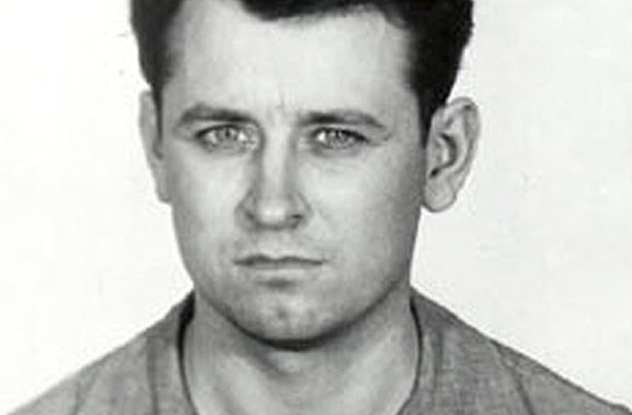 Movies and TV
Movies and TV  Movies and TV
Movies and TV  Weird Stuff
Weird Stuff 10 of History’s Greatest Pranks & Hoaxes
 Miscellaneous
Miscellaneous 10 LEGO Facts That Will Toy with Your Mind
 Misconceptions
Misconceptions 10 Widespread Historical Myths and the Texts That Started Them
 Crime
Crime 10 Incredible Big-Time Art Fraudsters
 Movies and TV
Movies and TV 10 Most Influential Fictional Objects in Cinema History
 Our World
Our World Top 10 Real Almost‑Cities That Never Materialized
 Technology
Technology 10 Unsettling Ways Big Brother Is (Likely) Spying on You
 Music
Music 10 Chance Encounters That Formed Legendary Bands
 Space
Space 10 Asteroids That Sneaked Closer Than Our Satellites
 Movies and TV
Movies and TV 10 Shared TV Universes You’ve Likely Forgotten About
 Weird Stuff
Weird Stuff 10 of History’s Greatest Pranks & Hoaxes
 Miscellaneous
Miscellaneous 10 LEGO Facts That Will Toy with Your Mind
Who's Behind Listverse?

Jamie Frater
Head Editor
Jamie founded Listverse due to an insatiable desire to share fascinating, obscure, and bizarre facts. He has been a guest speaker on numerous national radio and television stations and is a five time published author.
More About Us Misconceptions
Misconceptions 10 Widespread Historical Myths and the Texts That Started Them
 Crime
Crime 10 Incredible Big-Time Art Fraudsters
 Movies and TV
Movies and TV 10 Most Influential Fictional Objects in Cinema History
 Our World
Our World Top 10 Real Almost‑Cities That Never Materialized
 Technology
Technology 10 Unsettling Ways Big Brother Is (Likely) Spying on You
 Music
Music 10 Chance Encounters That Formed Legendary Bands
 Space
Space 10 Asteroids That Sneaked Closer Than Our Satellites
10 Daring Escapes That Succeeded Against All Odds
The things that people do to escape oppression are truly incredible. Below are stories of those who sought freedom—from prisons, from tyrannical regimes, and even from a pack of bloodthirsty natives. Sometimes, they rode off into the sunset, but not every story has a happy ending.
10The Real Jason Bourne

April 19, 2010, Los Angeles police arrived at a building after a tenant complained of a gasoline smell. When they entered the offending apartment, they found its occupant climbing out a window and scuttling down a fire escape in a fashion they would later liken to fictional superspy Jason Bourne.
The contents of the trashed apartment were a shock. Its resident, 34-year-old Brian Alexik, had drugs, forged passports, ammunition, an AK-47, a sawed-off shotgun, and $15,000 in counterfeit money. Photos found there depicted Alexik with different looks and hairstyles, as if attempting disguise. Most concerning of all was that the apartment had a direct view of the US Federal Reserve Building, leading investigators to wonder if he’d chosen the spot for that specific reason.
Alexik was apprehended six weeks later at his girlfriend’s Los Angeles apartment. He represented himself in court and successfully arranged a plea deal, avoiding any punishment.
9Escaping Prison In Drag

Most illegal drugs are rather cheaply produced. Cocaine is no exception. Purchased near its sources in South America, it is relatively inexpensive. The cost comes from the risk involved in transporting the substance over borders. Those willing to assume that risk can become millionaires—or spend the rest of their lives in prison.
In December 1973, a young man named Dwight Worker decided to smuggle cocaine from Peru into the United States. He had an ingenious plan—he would stuff the drugs inside a huge cast that covered his entire left arm and part of his body. However, police busted him in the airport in Mexico City, sending him to el Palacio Negro de Lecumberri (“The Black Palace of Lecumberri”), a notoriously dangerous and overcrowded prison.
Over the next two years, he was beaten and stabbed and spent 41 days in solitary confinement. But he also met Barbara White, who came to Lecumberri to visit another prisoner. The two fell in love and hatched a plot to get him out. White smuggled in what amounted to a transvestite starter kit, and Worker dressed up as a woman. Armed with fake documents, he walked out of Lecumberri in the guise of a visitor. He reported being a bit unsteady on his high heels, but he managed to fool his captors.
As in many other countries, escaping from prison is not illegal in Mexico, provided no one is hurt and no property is damaged, a policy called ley de fuga (“law of flight”). However, the flip side of this rule is that guards are allowed to shoot fleeing inmates if they are caught. Dwight was in good company. The only other man that had ever escaped from Lecumberri was Mexican general Pancho Villa.
Worker later penned a memoir of his story titled Escape, and National Geographic’s Locked Up Abroad covered the amazing story.
8James Earl Ray

James Earl Ray shouldn’t have been able to assassinate Martin Luther King Jr. on April 4, 1968. He should have been behind bars at the Missouri State Penitentiary.
By his early twenties, James had become a career criminal with a string of armed robberies and burglaries to his name. In the late 1950s, he did a three-year stint in Leavenworth Federal Penitentiary for mail fraud. In 1959, he robbed a Kroger grocery store in St. Louis, Missouri, netting the princely sum of $120. During the trial, he tried unsuccessfully to escape the St. Louis courthouse. He was convicted and sentenced to 20 years. Apparently, prison life didn’t suit Ray, because he attempted escape twice more, in 1961 and 1966.
On April 23, 1967, he tried something new. Taking advantage of his position working in the prison bakery, he had some fellow inmates pack him in one of the boxes that was used for shipping bread. The box was picked up by a delivery truck, and Ray rode off to freedom.
His story of escapes doesn’t end there. After being sentenced to 99 years for killing King, James Earl Ray was sent to Brushy Mountain State Prison in Tennessee, an institution that (at the time) boasted that no man had ever escaped. On June 10, 1977, a consortium of inmates staged a fight to distract the guards. Then Ray and six other men escaped over the fence on a homemade ladder.
This time, his freedom didn’t last long. He was found just over two days later, less than 8 kilometers (5 mi) from the prison and hiding in a pile of leaves. This was James Earl Ray’s last escape attempt. He died of hepatitis C in 1998.
7Saved By Gospel
Stories of children kidnapped by strangers rarely have happy endings. Outsmarted and overpowered, the children are often heinously victimized.
On March 31, 2014, nine-year-old Willie Myrick was playing in the front yard of his home in Atlanta, Georgia when he saw some money lying on the ground. When he walked over to pick it up, a man abducted him and threw him into a car.
The kidnapper, whom Willie had never seen before, urged him to be quiet. Instead, the boy sang the gospel song “Every Praise” by Hezekiah Walker for nearly three hours as the kidnapper drove through the city. Just what the man had in mind for Willie will thankfully remain unknown, as the singing infuriated him into a cursing fit. He threw Willie out of his car, warning him to tell no one what had happened.
Willie’s story gets even better. Upon learning of the incident, Hezekiah Walker flew down from New York to meet the boy, sharing a tearful embrace and leading Willie and the entire congregation of Mt. Carmel Baptist Church in a rendition of “Every Praise.” Walker later said, “I really believe that God spoke through me to save that young man’s life.”
6The Airstan Incident

Afghanistan has been wracked by war for nearly 40 years. After the USSR withdrew in 1989, the communist government was besieged by an Islamic fundamentalist group we have come to know as the Taliban, who began seizing land. On August 3, 1995, a Russian aircraft loaded with supplies for President Burhanuddin Rabbani was intercepted by Taliban fighter jets and forced to land at Kandahar International Airport.
The Airstan Ilyushin II-76TD plane carried seven Russian nationals, who were promptly captured. The Taliban offered the Russian government a prisoner trade, but the Russians claimed they had no Afghans in custody. American Senator Harry Brown tried to intercede, getting the Taliban to agree to one concession—that while they were in Afghanistan, the crewmembers would be able to keep taking care of their plane.
The Russians, held hostage for just over a year, were allowed to work on the Ilyushin under the supervision of Taliban soldiers. The standard guard was six men, but on August 16, 1996, three of the guards left for afternoon prayers. The Russians made their move, attacking the remaining guards and firing up the plane.
The Taliban tried to block the runway with a fire engine, but the plane took off, quickly escaping controlled airspace and making its way to the United Arab Emirates. The incident was later dramatized in the 2010 film Kandahar.
5A Tank Through The Berlin Wall

It is impossible to say exactly how many attempts were made to cross the Berlin Wall. There were many ingenious gambles, such as tunneling beneath it and even building a hot air balloon. Unfortunately, trying to scale the wall was an offense that could get you shot on sight. Well over 100 people died trying.
In April 1963, East German soldier Wolfgang Engels decided the best route into West Germany was to go not over the Berlin Wall but through it. Engels stole an armored personnel carrier (APC) and rammed the wall. He failed to smash it down, so he jumped out of the APC and tried to climb the wall. The East Germans opened fire on him, shooting him twice while he was tangled in barbed wire.
Unlike many such stories, Wolfgang’s has a happy ending. West Germans were able to pull him to safety, and he later recovered from his wounds.
4Alexander Pearce, Cannibal

Detractors of the penal system often point out that shoving prisoners together often makes nearly innocent people into hardened criminals. This likely happened in the case of Alexander Pearce. Born in Ireland in 1790, Pearce was sentenced to the penal colony Van Diemen’s Land (now known as Tasmania), for the crime of stealing six pairs of shoes.
Pearce arrived in February 1821 and began making trouble. Frequent lashings did nothing to change his behavior—he continued to steal, drink to excess, and try to escape. Fed up, the local magistrates sent him off to the separate Macquarie Harbour prison settlement. Macquarie was infamous for its horrible conditions; there was little food, and the prisoners were wracked by scurvy. Pearce was there only a few weeks before he escaped again, fleeing into the rainforest with seven other convicts, led by axe-wielding prisoner Robert Greenhill.
The escape proved far worse than imprisonment. This forest had some of the world’s most tortuous geography, and eight days later, the men were starving. Seven fell upon one and devoured him. Horrified that they might be next, two of them men returned to Macquarie, leaving a company of five. Two more died as they continued on their journey. That left three—Pearce, Greenhill, and another man named Matthew Travers, who was close friends with Greenhill.
This might have been bad news for Pearce, but Travers just happened to get bitten on the foot by a venomous tiger snake. The wound grew gangrenous, and Travers was in such agony that he begged for death. They obliged. The two remaining men now eyed each other warily, but in the end, Pearce managed to kill Greenhill in his sleep.
Pearce made it to civilization, where he struck up his old ways until he was recaptured. The magistrates didn’t believe his cannibalistic tale, instead thinking he was covering for mates who remained at large.
He went on to prove them wrong. He escaped again time, this time in the company of a man named Thomas Cox. When he surrendered 11 days later, he had some of Cox’s flesh in his pocket. Pearce admitted that he quite enjoyed the taste of human meat, finding it preferable to other food. He was hanged on July 19, 1824.
3Thomas Kretschmann

Thomas Kretschmann isn’t exactly a household name, but you’ve doubtlessly seen him in any one of the dozens of movies in which he’s appeared, from King Kong to Wanted. He most recently appeared as Marvel villain Baron Strucker in Captain America: The Winter Soldier. Kretschmann was born in 1962 in East Germany. At the age of 19, he decided to escape to the West.
Instead of tackling the Berlin Wall, Kretschmann decided to take the circuitous route. With only his passport and about $100, he set off on an adventure that took him across four borders, into Hungary, Yugoslavia, Austria, and finally West Germany. It was a perilous journey. The borders were stationed with armed guards, and the ground was littered with land mines. It took him a month, and he lost part of a finger to frostbite.
His family wasn’t exactly thrilled by the move. He later said, “My mother was in the Communist Party, and she was the principal of a school, so she wasn’t very happy.”
2Little Houdini
Christopher Gay grew up dirt poor in the backwoods of Tennessee. Constantly hungry, he was ridiculed in school for eating food out of the garbage. Things got so bad that he and his brother made a suicide pact, but they couldn’t go through with it. Chris began stealing to get by, first little things like snack cakes or the neighbor’s chickens. He later graduated to cars.
Chris was apprehended repeatedly but escaped police custody an astonishing 13 times. He picked handcuffs with paper clips, faked suicide attempts, and even sprinkled pepper on his clothes to elude police dogs.
His most elaborate escape occurred in 2007, when he escaped a prison transport van so he could visit his dying mother. Gay swiped a pickup truck then traded it for a Wal-Mart tractor trailer loaded with merchandise. Police chased him down Tennessee back roads to his mother’s house, where the truck became stuck in the mud.
With the law at his back, Chris jumped out of the cab and disappeared into the woods. His next move was stealing the tour bus of country singer Crystal Gayle in Nashville then driving to the USA International Speedway in Lakeland, Florida, where he claimed to be employed by driver Tony Stewart. He was apprehended shortly thereafter.
1Hunted By Braves

First appearing in Collier’s magazine in 1924, Richard Connell’s short story “The Most Dangerous Game” inspired a genre still popular today—the story of a man being hunted like a beast, the most cunning and dangerous quarry. However, men had been hunted for sport long before the story was written.
One of these was early American explorer John Colter, who participated in the Lewis and Clark Expedition between 1804 and 1806. The following year, he passed through the territory that would later become Yellowstone National Park, bringing back bizarre stories of hot springs and geysers.
In 1809, while traveling along the Jefferson River in Montana, Colter and fellow explorer John Potts encountered a group of several hundred Blackfoot Indians. The pair were ordered ashore. Colter complied, and he was stripped naked; Potts fired upon the braves and was killed in a hail of bullets. They subsequently chopped Potts’s corpse to pieces.
Colter likely imagined that this would be his last adventure. However, the Blackfoot released him, indicating that he should run. A group of braves gave chase, hunting him down. Colter, an experienced outdoorsman and a fast runner, outpaced the group until only a lone brave kept pace. Wearied by the pursuit and bleeding heavily from the nose, John turned to face his opponent.
The brave was tired and fell while throwing his spear. The spear then hit the ground and broke, but Colter picked up the sharp end and killed the brave. With the pack gaining ground, he was forced to take refuge inside a beaver lodge. He made it out eventually, but he didn’t make his way back to civilization for nearly two weeks, naked and subsisting on roots dug from the ground.








